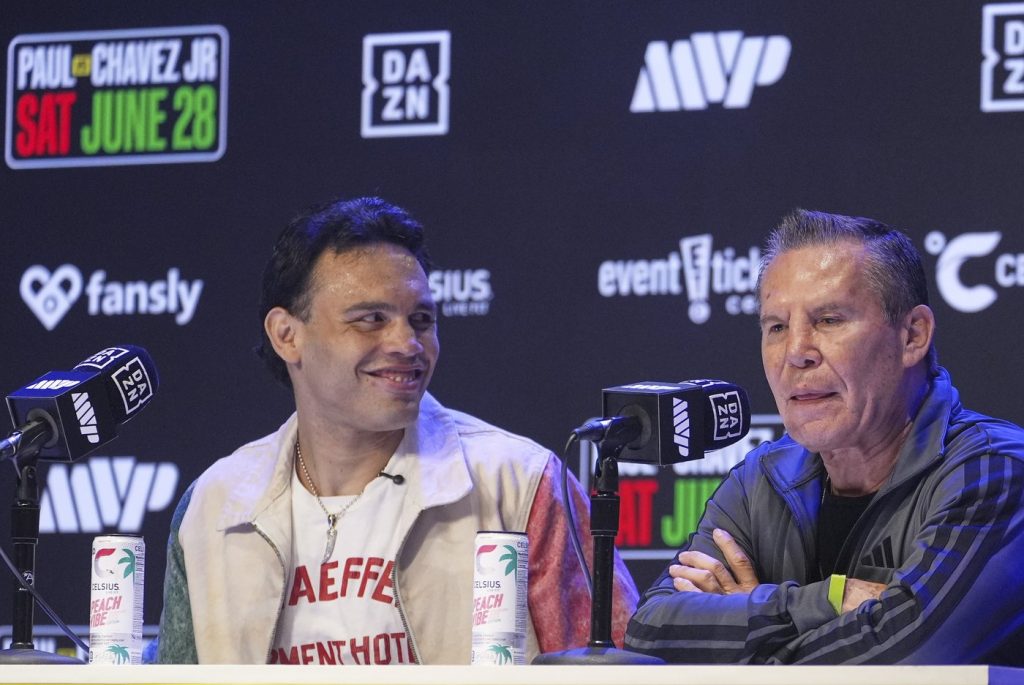CULIACAN, Mexico - During a boxing event held on Friday in Culiacan, the capital of Sinaloa state, the atmosphere was subdued as young amateur boxers donned puffy headgear and sparred in the ring. Outside the venue stood a bronze statue of famed boxer Julio César Chávez, famously recognized with one glove raised. Although the event was organized by one of Chávez's brothers and featured “The Legend” as a special guest, he did not attend, as the family faced significant turmoil that week.
Chávez's eldest son, Julio César Chávez Jr., was arrested by U.S. immigration officials outside his home in Los Angeles on Wednesday, accused of overstaying his visa and providing false information on a green card application. Complicating matters further, the U.S. Department of Homeland Security revealed an active arrest warrant against him in Mexico, linked to alleged arms and drug trafficking and suggested connections to the notorious Sinaloa Cartel. He is now set to be processed for expedited removal from the United States.
In Culiacan, the name Julio César Chávez evokes a sense of reverence akin to that of Diego Maradona in Argentina. Chávez is regarded as an idol and a source of pride for the city, having risen from humble beginnings to become a symbol of national glory in the boxing world. However, discussions about the controversies surrounding Chávez Jr. and his alleged ties to organized crime bring about an uneasy silence among locals.
Historically, residents of Culiacan had been open about discussing the Sinaloa Cartel, often using euphemisms, as the cartel’s influence allowed them a semblance of peace. However, recent violent conflicts within cartel factions have shifted this dialogue. A particularly bloody dispute erupted last year after the abduction of Ismael “El Mayo” Zambada by a faction led by a son of the former leader, Joaquín “El Chapo” Guzmán. This turmoil has made it more perilous for residents to speak on the topic, leading to an atmosphere of fear and reticence.
On the night of the event, whispers about Chávez Jr.’s arrest permeated the crowd, but were exchanged only in hushed tones. Sports reporter Óscar Arrieta noted that the sudden exposure of the U.S. government to the Mexican government, particularly amid Chávez Jr.'s arrest, created significant ripples in the community. Speculating on the inaction toward Chávez Jr. given his social media presence and public visibility, Arrieta questioned the Mexican authorities' reluctance to capture him since the warrant was issued in 2023. Mexican President Claudia Sheinbaum indicated that Chávez Jr. had largely remained in the U.S. since the warrant was first issued.
The tension was tangible in Culiacan's boxing gyms leading up to the event, with many staying quiet following the announcement of Chávez Jr.'s arrest. At one gym, teenagers practiced shadow boxing, while Jorge Romero, a former professional boxer and current trainer at Sinaloa Autonomous University, expressed his belief in Chávez Jr.'s character. He described him as an "excellent person" who had dedicated himself to training for a highly publicized fight scheduled in California just a week before his arrest. Romero expressed full support for Chávez Jr. but refrained from discussing the implications of the alleged cartel connections, emphasizing a clear separation between boxing and organized crime in the region.
Romero stated, "We don’t have anything to do with organized crime. On the contrary, it’s a clean sport, very healthy from my point of view." His sentiments illustrate a collective hope among many in Culiacan that the image of boxing as a sport can remain untarnished amid the growing scrutiny surrounding the Chávez family and its association with criminal elements.











